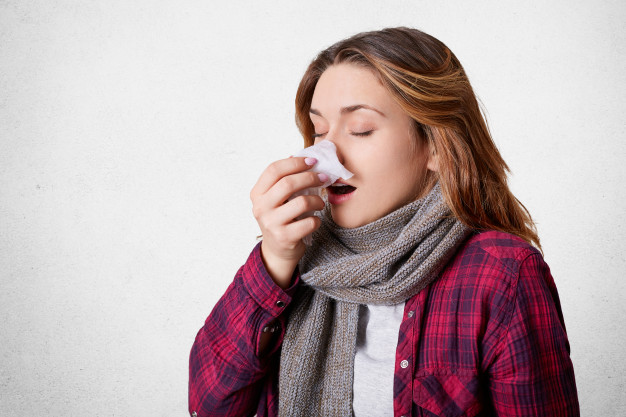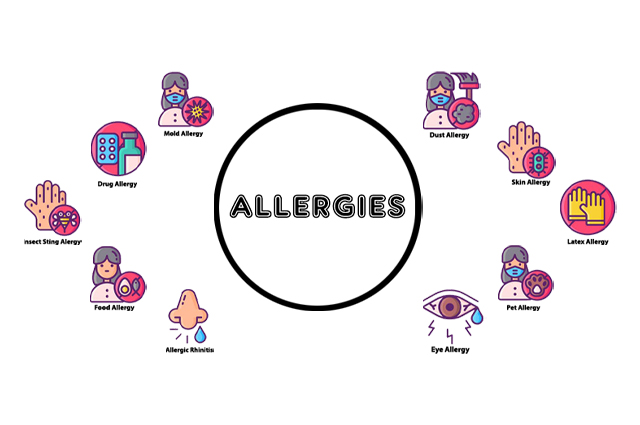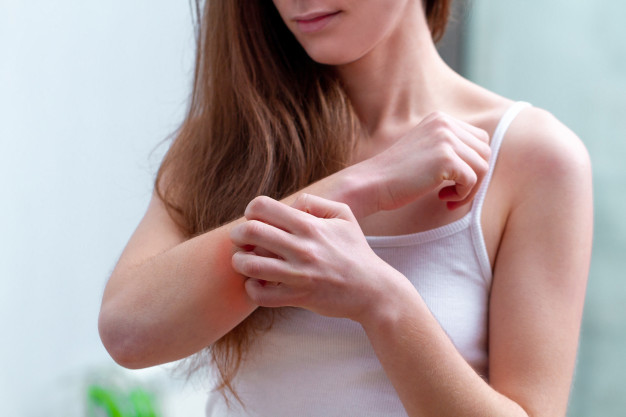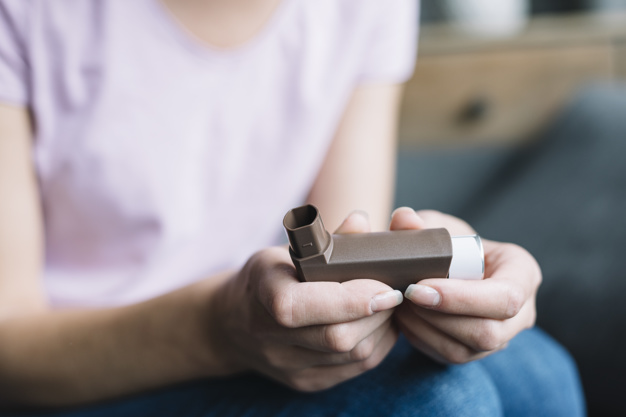TREATMENT FOR ALLERGIC RHINITIS

ALLERGIC RHINITIS
Allergic rhinitis, commonly known as hay fever – is a type of inflammation and the group of symptoms affecting the nose. But don’t be misled by the name – you don’t have to be exposed to hay to have symptoms. And hay fever doesn’t cause a fever.
Allergic rhinitis develops when the body’s immune system recognizes and overreacts to something in the environment that typically causes no problems in most people.
Hay fever shares many of the same symptoms as a common cold but is not caused by a virus or bacteria. Instead, it is caused by your immune system reacting to allergens you breathe into your body. Allergic rhinitis is not contagious.Your body’s overreaction to the allergens causes symptoms.
CAUSES
Allergic rhinitis triggered by the pollen of specific seasonal plants is commonly known as "hay fever", because it is most prevalent during haying season. However, it is possible to have allergic rhinitis throughout the year. The pollen that causes hay fever varies between individuals and from region to region; In general, the tiny, hardly visible pollens of wind-pollinated plants are the predominant cause. Pollens of insect-pollinated plants are too large to remain airborne and pose no risk. Examples of plants commonly responsible for hay fever include:
- rees: such as pine , birch, alder , cedar, hazel, hornbeam, horse chestnut, willow, poplar, plane, linden/lime, and olive. In northern latitudes, birch is considered to be the most common allergenic tree pollen, with an estimated 15–20% of people with hay fever sensitive to birch pollen grains. Olive pollen is most predominant in Mediterranean regions.Allergy friendly trees include: ash , red maple, yellow poplar, dogwood, magnolia, double-flowered cherry, fir, spruce, and flowering plum.
- Grasses (Family Poaceae): especially ryegrass and timothy . An estimated 90% of people with hay fever are allergic to grass pollen.
- Weeds: ragweed, plantain, nettle/parietaria, mugwort, Fat hen, and sorrel/dock.
Allergic rhinitis may also be caused by allergy to Balsam of Peru, which is in various fragrances and other products.
Predisposing factors to allergic rhinitis include eczema and asthma. Additionally, environmental exposures such as air pollution and maternal tobacco smoking can increase an individual's chances of developing allergies.
TYPES OF ALLERGIC RHINITIS
- Seasonal: Symptoms of seasonal allergic rhinitis can occur in spring, summer, and early fall. They are usually caused by allergic sensitivity to airborne mold spores or to pollen from trees, grass, and weeds
- Perennial: People with perennial allergic rhinitis experience symptoms year-round. It is generally caused by dust mites, pet hair or dander, cockroaches, or mold. Underlying or hidden food allergies rarely cause perennial nasal symptoms.
Some people may experience both types of rhinitis, with perennial symptoms getting worse during specific pollen seasons. There are also non allergic causes for rhinitis including irritants such as cigarette or other smoke, perfumes, cleaning products and other strong odors. It’s time to take control of your allergic rhinitis and start enjoying life again.
SYMPTOMS OF ALLERGIC RHINITIS
People with allergic rhinitis generally experience symptoms after breathing in an allergy-causing substance such as pollen or dust. In the spring, the most common triggers are tree and grass pollen. In the fall, a common allergen is ragweed or other weed pollen or outdoor mold.
When a sensitive person inhales an allergen, the body’s immune system may react with the following symptoms (listed in order of frequency):
- Stuffy nose due to blockage or congestion
- Runny nose or post nasal drainage
- Itching, usually in the nose, mouth, eyes, throat and skin
- Red and watery eyes
- Puffy, swollen eyelids
- Sneezing
- Cough
- Headache
- Fatigue (often reported due to poor quality sleep as a result of nasal obstruction)
- Pressure in the nose and cheeks
- Sore throat
- Dark circles under your eyes.
- Trouble smelling
- Hives
Symptoms also may be triggered by common irritants such as:
- Cigarette smoke
- Strong odors, such as perfume, or hair spray and fumes
- Cleaning solutions, pool chlorine, car exhaust and other air pollutants (i.e., ozone)
- Air fresheners
Allergic rhinitis can last several weeks, longer than a cold or the flu. It does not cause fever. The nasal discharge from hay fever is thin, watery, and clear. Nasal discharge from a cold or the flu tends to be thicker. Itching (mostly in the eyes, nose, mouth, throat, and skin) is common with hay fever but not with a cold or the flu. Sneezing occurs more with hay fever.
ALLERGIC RHINITIS CAN BE ASSOCIATED WITH:
- Decreased concentration and focus
- Limited activities
- Decreased decision-making capacity
- Impaired hand-eye coordination
- Problems remembering things
- Irritability
- Sleep disorders
- Fatigue
- Missed days of work or school
- More motor vehicle accidents
- More school or work injuries
Many parents of children with allergic rhinitis have said that their children are more moody and irritable during allergy season.
It is important that the irritability or other symptoms caused by allergy symptoms are not mistaken for attention deficit disorder. With proper treatment, symptoms can be kept under control and disruptions in learning and behavior can be avoided.
Many people have recurrent or chronic nasal congestion, excess mucus production, itching and other nasal symptoms similar to those of allergic rhinitis. In those cases, an allergy may not be the cause.
RISK FACTORS
The risk factors for allergic rhinitis include the following:
- The presence of other allergic diseases such as asthma, eczema
- Parental rhinitis
- Allergic sensitization to common household aeroallergens
- Obesity/being overweight
- Elevated exhaled Nitric oxide
- High total serum IgE
- Exposure to parental smoking
- Exposure to pets
- Genetic predisposition
- Exposure to fossil fuel and traffic related pollutants
- Increased dampness and poor ventilation from tightly insulated modern homes (increases sensitization and allergy to molds)
- Early introduction of infants to formula/food
Increased risk of occupational rhinitis has been found in the following professions:
- Furriers
- Bakers
- Livestock breeders
- Food-processing workers
- Veterinarians
- Farmers
- Electronic product assemblers
- Boat builders
Our Branches
Valasaravakkam
Kotturpuram
DIAGNOSIS
Occasional allergies aren’t just something you have to live with. Consulting a doctor is the most effective way to diagnose and treat allergic rhinitis symptoms and help you find relief.
- Your doctor may start by taking a detailed history, looking for clues in your lifestyle that will help pinpoint the cause of your symptoms.
- You’ll be asked, among other things, about your work and home environments (including whether you have a pet) your family’s medical history and the frequency and severity of your symptoms.
- Your doctor may recommend a skin test, in which small amounts of suspected allergens are introduced into your skin. Skin testing is the easiest, most sensitive, and generally least expensive way of identifying allergens.
- Your doctor may also decide to do a blood test, such as the radioallergosorbent test (RAST). This test identifies antibodies in your blood that determine what you’re allergic to. Once your allergens are identified, your doctor can decide the best treatment.
Types of skin tests
- Prick or scratch test : In this test, a tiny drop of a possible allergen is pricked or scratched into the skin. Also known as a percutaneous test, this is the most common type of skin test. The results are known within 10 to 20 minutes.
- Intradermal test : A small amount of a possible allergen is injected under the skin using a thin needle. The site is checked for a reaction after about 20 minutes. This test is typically more sensitive than the prick or scratch test.
COMPLICATIONS
Sometimes allergic rhinitis can be complicated by several medical conditions, such as a deviated septum (curvature of the bone and cartilage that separate the nostrils) or nasal polyps (abnormal growths inside the nose and sinuses). Any of these conditions will be made worse by catching a cold. Nasal symptoms caused by more than one problem can be difficult to treat.
PREVENTION
The first approach in managing seasonal or perennial forms of allergic rhinitis or hay fever should be to avoid the allergens that trigger symptoms, if possible.
Outdoor exposure
- Stay indoors as much as possible when pollen counts are at their peak, usually during the midmorning and early evening (this may vary according to plant pollen), and when wind is blowing pollen around.
- Avoid using window fans that can draw pollen and molds into the house.
- Wear glasses or sunglasses when outdoors to minimize the amount of pollen getting into your eyes.
- Don’t hang clothing outdoors to dry; pollen may cling to towels and sheets.
- not to rub your eyes; doing so will irritate them and could make your symptoms worse.
Indoor exposure
- Keep windows closed and use air conditioning in your car and home. Make sure to keep your air conditioning unit clean.
- Reduce exposure to dust mites, especially in the bedroom. Use “mite-proof” covers for pillows, comforters and duvets, and mattresses and box springs. Wash your bedding frequently, using hot water (at least 130 degrees Fahrenheit).
- To limit exposure to mold, keep the humidity in your home low (between 30 and 50 percent) and clean your bathrooms, kitchen, and basement regularly. Use a dehumidifier, especially in the basement and in other damp, humid places, and empty and clean it often. If mold is visible, clean it with mild detergent and a 5 percent bleach solution as directed by an allergist.
- Clean floors with a damp rag or mop, rather than dry-dusting or sweeping.
Exposure to pets
- Wash your hands immediately after petting any animals; wash your clothes after visiting friends with pets.
- If you are allergic to a household pet, keep your pet out of your home as much as possible. If the pet must be inside, keep it out of your bedroom so you are not exposed to pet allergens while you sleep.
- Close the air ducts to your bedroom if you have forced-air or central heating or cooling. Replace carpeting with hardwood, tile, or linoleum, all of which are easier to keep dander-free.
CONVENTIONAL TREATMENT FOR ALLERGIC RHINITIS
Several medicines can be used to treat allergies. Your doctor will help you determine what medicine is best for you depending on your symptoms, age, and overall health. These medicines help prevent symptoms if you use them regularly, before you’re exposed to allergens.
- Antihistamines help reduce the sneezing, runny nose, and itchiness of allergies. These come in pill form and as nasal sprays.
- Decongestants such as pseudoephedrine and phenylephrine, temporarily relieve a stuffy nose of allergies. Decongestants are found in many medicines and come as pills, nose sprays, and nose drops. They are best used only for a short time.However, decongestants can raise your blood pressure. Talk to your family doctor before using them if you have high blood pressure.
- Leukotriene inhibitors are prescription pills that help block leukotrienes. Leukotrienes are another class of chemicals that the body releases when exposed to allergens.
- Cromolyn sodium is a nasal spray that helps prevent the body’s reaction to allergens. This medicine may take 2 to 4 weeks to start working.
- Nasal steroid sprays reduce the reaction of the nasal tissues to inhaled allergens. This helps relieve the swelling in your nose so that you feel less stopped-up. They are the most effective at treating patients who have chronic symptoms.
- Eye drops If your other medicines are not helping enough with your itchy, watery eyes, your doctor may prescribe eye drops for you.
- Allergy shots or sublingual tablets (also called immunotherapy) are an option for people who try other treatments but still have allergy symptoms. These shots or dissolvable tablets contain a very small amount of the allergen you are allergic to. They’re given on a regular schedule so that your body gets used to the allergens. This helps decrease your body’s sensitivity to the allergens. Over time, your allergy symptoms will become less severe.
BEST TREATMENT FOR ALLERGIC RHINITIS
Acupuncture alleviates nasal and eye itching, sneezing, and runny nose for patients with allergic rhinitis.Researchers confirm that acupuncture successfully downregulates IgE (immunoglobulin E), an antibody active in hypersensitivity reactions, while simultaneously reducing symptoms of allergic rhinitis.
CLINICAL DIAGNOSIS OF ALLERGIC RHINITIS AND ACUPUNCTURE TREATMENT
Allergy testing is not definitive. At times, these tests can reveal positive results for certain allergens that are not actually causing symptoms, and can also not pick up allergens that do cause an individual's symptoms. The intradermal allergy test is more sensitive than the skin prick test, but is also more often positive in people that do not have symptoms of that allergen.
Even if a person has negative skin-prick, intradermal and blood tests for allergies, he/she may still have allergic rhinitis, from a local allergy in the nose. This is called local allergic rhinitis.Specialized testing is necessary to diagnose local allergic rhinitis.
EFFECTIVENESS OF ACUPUNCTURE TREATMENT
Several mechanisms responsible for the effects of acupuncture have been suggested, including the release of neurochemicals, such as β‐endorphins, enkephalins and serotonin. Another theory suggests that the effects of acupuncture may be the result of the regulation of the autonomic nervous system, by altering sympathetic and parasympathetic nervous system activity or by increasing local blood flow and nitric oxide production .
In allergic rhinitis, acupuncture could act as a modulator of anti‐inflammatory cytokines and by neuroimmunological mechanisms, e.g. lowering plasma levels of vasoactive intestinal peptide and substance P.
A German pragmatic trial suggested that treating patients with allergic rhinitis in routine care with additional acupuncture leads to clinically relevant and persistent benefits . Additionally, ear acupressure for allergic rhinitis was shown to be as effective as body acupuncture or
antihistamine treatments for producing short‐term effects. However, ear acupressure was more effective than antihistamines for long‐term effects. Acupuncture may help to improve blood rheology indexes by causing an increased volume of blood flow. Additionally, it may regulate the immunological functions of the human body and thus provide therapeutic effects
MECHANISM AND ACUPUNCTURE
The main meridians that provide for circulation of the defensive Qi are the lung, colon, stomach and spleen meridian — the meridians of the anterior circulation. Allergy in the viewpoint of Traditional Chinese Medicine is a “wind” disease that penetrates from externally together with “cold” or “heat” and impedes the defensive Qi flow in the lung, the skin and the mucous membranes. This results in a backup (fullness) or a deficiency (emptiness) of the defensive Qi leading to the development of the typical symptoms of allergies such as swelling, watery secretion, sneezing, allergic eczema and conjunctivitis. The diagnostic approach in TCM and the conclusions gained from this knowledge are difficult to comprehend from the viewpoint of western medicine and have little in common with our perceptions on the pathogenesis of allergy.
In supine position,
- Baihui (GV20)
- Yintang (MHN3)
- Yingxiang (LI20)
- Hegu (LI4)
- Guanyuan (CV4)
- Zusanli (ST36)
- Taichong (LV3)
In a prone position:
- Fengchi (GB20)
- Dazhui (GV14)
- Jiaji (MBW35: 3 upper thoracic region points)
- Ganshu (BL18)
- Pishu (BL20)
- Shenshu (Bl23)
ACUPUNCTURE FOR ALLERGIC RHINITIS
Acupuncture is a safe and effective treatment modality for patients with allergic rhinitis. Acupuncture reduces nasal and eye symptoms including itching, sneezing, and runny nose. In addition, acupuncture regulates IgE for patients with allergic rhinitis.The overall aim of acupuncture treatment is to restore the body’s equilibrium.
The acupuncture point as such has in the meantime been studied and characterized anatomically and physiologically. Anatomically, the majority of the acupuncture points (up to 80 %) represent perforations in the superficial body fascia, through which blood vessels and nerve bundles reach the skin embedded in loose connective tissue. It has been shown that these points have a higher density of receptors and to a great extent (up to 71 %) represent myofascial trigger points. From a physiologic viewpoint a higher electric conductivity and ion exchange capacity of the connective tissue can be demonstrated at the acupuncture point.
The peripheral circulation of the skin and of the muscles is supposed to be improved as well as regulatory mechanisms of the vegetative nervous system to be modulated. Further, it is assumed that endorphins, enkephalins and dynorphins are released.
However, also other diseases can be influenced in their chronic or their acute phase. Several times an impact on the immune system has been demonstrated. Acupuncture is assumed to modulate the activity of natural killer cells, lymphocyte proliferation, chemotaxis and phagocytosis . Also a reduction of the eosinophil count in the blood and nasal secretion was observed.
RELIEF
Acupuncture is presumably capable of influencing the cytokine profile. Several studies on bronchial asthma and allergic rhinitis describe in patients a modulating effect of acupuncture on the cytokine profile with simultaneous improvement of signs and symptoms. It is remarkable that through acupuncture the production of not all cytokines is altered. Particularly affected by acupuncture are Interleukin-10, Interleukin-2 and Interferon γ. Beyond these cytokine-modulating effects, some authors also report a reduction of Immunoglobulin E concentrations in the blood. Despite the lack of studies on the direct relationship between cytokine alterations and the reduction of symptoms, these studies suggest that this is in fact connected with alterations of cytokine production.
BEST CURE FOR ALLERGIC RHINITIS
Looking for the best relief for allergic rhinitis in Chennai, here’s why you should reach out to the expert Acupuncturist Acupuncturist. A. Shaji Bharath from the best rated clinic Dr.Bharath’s Acu Heal. He is currently treating patients for a wide range of conditions. As a best acupuncture practitioner with 15 years of experience, and having worked with several Urologists,Dermatologist, Neurologists and Otolaryngologists, Acupuncturist. A. Shaji Bharath can create the treatment plan for the best cure for Allergic rhinitis to manage the condition that's tailored to your needs, which can break a cycle of repeated running nose. As the top acupuncture doctor for the allergies in Chennai, he has witnessed acupuncture doing wonders on people suffering from allergic rhinitis. The effectiveness rate increases several times just with one course of Acupuncture and a specialized expertise in allergies are warranted. So, take some time to find the right management for hay fever and the best remedy for acupuncture approach that suits you. Most of the people swear by acupuncture, citing it as a best cure and a ‘miracle’ in improving their quality of life.
Dial: +91 9884746916 or Visit: drbharathsacuheal.com for more details on treating all types of allergies using Acupuncture,by contacting the top acupuncture doctor in Chennai.
TREATMENT FOR ALLERGIC RHINITIS WITHOUT SIDE EFFECTS
Intranasal corticosteroids are the preferred medical treatment for persistent symptoms, with other options if this is not effective. Second line therapies include antihistamines, decongestants, cromolyn, leukotriene receptor antagonists, and nasal irrigation.Antihistamines by mouth are suitable for occasional use with intermittent side effects. While treated using Acupuncture,the patient gets effective treatment with no side effects. The Acupoints are carefully chosen by our expert to treat Allergic Rhinitis. Acupuncture is effective for rhinitis, specifically targeting the sphenopalatine ganglion acupoint.
BEST ACUPUNCTURE DOCTOR NEAR ME
To choose the Best doctor for Acupuncture, it's important that the Acupuncturist should have a decade of experience and treated at least 1000 to 2000 patients.
You can also search for the Best Acupuncture Doctor near me or ask your primary care physician to refer an experienced Acupuncturist nearby. Once you find the Best Acupuncture Doctor in Chennai, you may go through their google reviews first and then fix an appointment with the doctor only when you are satisfied with the reviews.
The Best Acupuncture Doctor should address your concerns and help you feel more comfortable before your first session. Acupuncture usually takes numerous sessions or several weeks to get a complete cure in any ailment but within 3 or 4 sessions the patients will experience positive differences.
BEST ACUPUNCTURE CLINIC NEAR ME
Owing to the demand for the treatment, there are numerous clinics popping up and it is sometimes skeptical to choose the best or even the safe one. To address such concerns, you can look into the following points to choose the best acupuncture clinic for Allergic Rhinitis. Acupuncture is also offered in hospitals, pain clinics and by healthcare organizations but it is ideal to visit the best Acupuncture Clinic for Allergic Rhinitis. If you are not sure, it would be a good idea to contact your local doctor to see if they would be prepared to refer to the best rated acupuncture clinics. For example in cases where a patient specifically requests acupuncture for Allergic Rhinitis, or where it is felt that acupuncture would complement
conventional treatment. In some cases acupuncture is offered in top rated acupuncture clinics near me because conventional treatment has failed or produces unacceptable side effects.
We have been rewarded a 5-star rating from Google & Practo. You can also check the reviews there.
THE BOTTOM LINE
Allergic rhinitis is the type of allergy that affects the greatest number of people. The remedies in this article might not work for everyone as it has got several side effects. But, if you live with severe allergic rhinitis, you may still want to consult a doctor, You can book an appointment with our Acupuncturist using our email i.d drbharathsacuheal.com.
SCIENTIFIC REFERENCES:
- Stör W., Irnich D. Acupuncture: basics, practice, and evidence.
Schmerz. 2009;23:405–17. doi: 10.1007/s00482-009-0808-3. - Kim S.K., Bae H. Acupuncture and immune modulation. Auton Neurosci. 2010;157:38–41.
doi: 10.1016/j.autneu.2010.03.010. - WArranz L., Guayerbas N., Siboni L., de la Fuente M. Effect of acupuncture treatment on the immune function impairment found in anxious women. Am J Chin Med. 2007;35:35–51. doi: 10.1142/S0192415X07004606.
For further clarifications or
to fix an Appointment
Thank you for choosing us
Our experts will get back to you at the earliest
or
FAQ:
What are the services provided for allergic rhinitis by Dr. Bharath’s Acu Heal?
The Acupuncturist will understand the condition of the disease only after doing a thorough investigation by pulse and tongue diagnosis. Acupuncture treatment will be given based on the disease’s chronicity and acuteness. In the first few sessions, there will be positive changes in the symptoms and after few more sessions, there will be a 90% to 100% chance that the patient will get cured of Allergic Rhinitis. The patient will be advised on a diet with food restrictions, exercise regime which includes a sound sleep that plays a vital role in reversing the disease.
What are the benefits of acupuncture for allergic rhinitis?
This is a drugless therapy and so there are no side effects. After completing the course of treatment any form of medication can be stopped.
How many sessions of acupuncture do you need for allergic rhinitis?
Approximately 20 to 30 sessions would be needed (3 to 4 months)



 TREATMENT FOR ALLERGY
TREATMENT FOR ALLERGY
 TREATMENT FOR ALLERGIC BRONCHITIS
TREATMENT FOR ALLERGIC BRONCHITIS
 TREATMENT FOR ASTHMA OR ALLERGIC ASTHMA
TREATMENT FOR ASTHMA OR ALLERGIC ASTHMA
